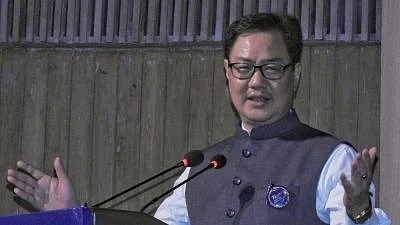Reacting to the Supreme Court order concerning the use of Sedition Law while it is under re-examination, Union Law Minister Kiren Rijiju on Wednesday, 11 May, said that while the Centre respects the court and its independence, "there's a 'Lakshman Rekha' that must be respected by all organs of the state in letter and spirit," news agency ANI reported.
"We've made our positions very clear and also informed the court about intention of our PM. We respect the court and its independence. But there's a 'Lakshman Rekha' (line) that must be respected by all organs of the state in letter and spirit," Rijiju stated.
"We have to ensure that we respect the provisions of the Indian Constitution as well as existing laws," he added.
Earlier, the Union minister had said, "PM Modi has asked to re-examine and re-consider the provision of the Sedition Law. PM urged to remove obsolete Sedition Law," adding that the government 'does not believe in misusing laws'.
Meanwhile, Congress spokesperson Randeep Singh Surjewala celebrated the apex court's decision saying that the "Supreme Court has sent a clear message."
"Suppressors and subjugators sitting in citadels of power be forewarned – Free Speech will not be throttled by autocrats and dictators masquerading as rulers. Speaking truth to power can't be sedition and status quo will change."Randeep Singh Surjewala
TMC leader Mahua Moitra hailed the decision as a 'victory'.
Background
On Monday, the Union government had asked the Supreme Court of India to defer hearing the challenges to the constitutionality of the Sedition Law, as it has "decided to re-examine and re-consider the provisions of Section 124A of the Indian Penal Code."
The apex court on Wednesday said that "it would be appropriate to put the provision on abeyance," adding that those already booked under Section 124A can approach the courts for bail.
The court also urged the central and state governments to refrain from registering any FIR invoking Section 124A.
The top court is hearing a batch of petitions, including pleas by retired Army Major General SG Vombatkere, the Editors Guild of India, and former Union Minister Arun Shourie, which have said that the Supreme Court's subsequent jurisprudence on fundamental rights means the 1962 decision in Kedar Nath Singh is no longer good law.
(With inputs from ANI.)
(At The Quint, we question everything. Play an active role in shaping our journalism by becoming a member today.)
